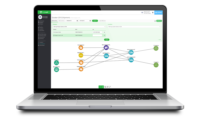In an effort to improve the global food supply chain, SAP SE, London, announced initiatives that use Big Data to help better understand the planet's diversity and  enhance food safety. The initiatives intend to use the SAP HANA platform to collect and analyze data to help crowdsource the identification and analysis of species globally as well as identify fraud in the global food supply.
enhance food safety. The initiatives intend to use the SAP HANA platform to collect and analyze data to help crowdsource the identification and analysis of species globally as well as identify fraud in the global food supply.
The International Barcode of Life (iBOL) project involves a consortium of institutions built into a database containing DNA barcodes for every species on the planet. The database currently hosts more than 400,000 species. However, to identify all the species on the planet, estimated at anywhere between 10-100 million, the iBOL project is looking to expand the number of people contributing to the research.
To help tackle the problem, SAP and the iBOL project collaborated to build the LifeScanner application, available on iTunes to crowdsource the collection and analysis of all of this information. LifeScanner is an application that anyone can use on an iPhone to collect a tissue sample or whole organism, send it off for analysis and get the species identification using DNA barcodes from anywhere on the globe. The application uses SAP SQL Anywhere solutions to ensure data integrity.
The SAP University Alliances program plans to help crowdsource the analysis of data collected through the LifeScanner application. The published DNA barcode data is intended to be made available to researchers and students for analysis and to be accessed through SAP HANA, SAP Lumira software as well as other third-party analytics tools.
"Whether its better understanding the human species or any other animal or planet species, there is no doubt that Big Data gives us the opportunity to better understand life all around us," says Irfan Khan, senior vice president and general manager, database and technology, SAP. "The volumes and sources of data continue to grow rapidly, and using this information intelligently can help prevent the extinction of species, promote new life science discoveries and improve the health of life on our planet. The SAP HANA platform helps organizations better process Big Data so they can acquire, analyze and act on insights in real time."
New research by the Biodiversity Institute of Ontario shows that food contamination and mis-labelling is prevalent across the herbs and spices, as well as fish and seafood categories. The soon-to-be-published market studies investigated product authenticity of common herbs and spices in the marketplace such as thyme, cinnamon, cloves and chilli powder. Drawing on early findings from the research project, adulteration was indicated in one-third of the products tested. This included product substitution, contamination and use of fillers, which were not listed on the product label.
Additionally, new research on seafood fraud in Canada, which examines adulteration of seafood over time, suggests that product substitution in the marketplace remains high, with more than 20% mis-labelling. This stands in contrast to studies in the UK that revealed a combination of increasing consumer awareness and regulatory enforcement resulted in a significant decrease in seafood fraud.
Traceability of food sources and confirmation of food product authenticity is difficult and time consuming. To help identify fraud in the food supply chain, SAP and Tru-ID are exploring solutions to increase visibility in the supply chain leveraging SAP HANA.
Integrating DNA-based verification testing and product authenticity certification into supply chain solutions from SAP will help companies identify the source of adulteration among their suppliers. Using SAP HANA Cloud Platform, companies can require suppliers to share independently audited tests. This would give companies better visibility into the authenticity of the foods provided by their supply chain.



